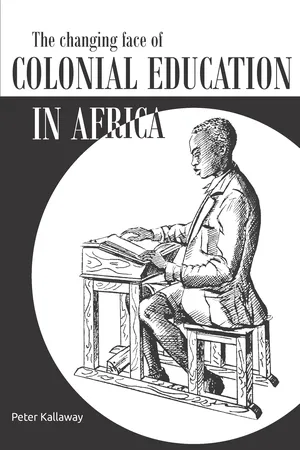
- 376 pages
- English
- PDF
- Available on iOS & Android
About this book
The Changing Face of Colonial Education in Africa offers a detailed and nuanced perspective of colonial history, based on 15 years of research that throws fresh light on the complexities of African history and the colonial world of the first half of the twentieth century. It provides an analytical background to the history of education in the colonial context by balancing contributions by missionary agencies, colonial government, humanitarian agencies, scientific experts and African agents. It offers a foundation for the analysis of modern educational policy for the postcolonial state. It attempts to move beyond cliches about colonial education to an understanding of the complexities of how educational policy was developed in different places at different times while giving credence to arguments that see schooling as a form of social control in the colonial environment. It is essential reading for academics, researchers and policymakers looking to better understand colonial education and contextualize modern developments related to the decolonizing African education. It is intended to provide an essential background for policy-makers by demonstrating the significance of a historical perspective for an understanding of contemporary educational challenges in Africa and elsewhere.
Frequently asked questions
- Essential is ideal for learners and professionals who enjoy exploring a wide range of subjects. Access the Essential Library with 800,000+ trusted titles and best-sellers across business, personal growth, and the humanities. Includes unlimited reading time and Standard Read Aloud voice.
- Complete: Perfect for advanced learners and researchers needing full, unrestricted access. Unlock 1.4M+ books across hundreds of subjects, including academic and specialized titles. The Complete Plan also includes advanced features like Premium Read Aloud and Research Assistant.
Please note we cannot support devices running on iOS 13 and Android 7 or earlier. Learn more about using the app.
Information
Table of contents
- Contents
- Tables
- Illustrations
- Foreword
- Acknowedgements
- Notes
- Abbreviations
- Introduction
- The genesis of educational policy in late colonial Africa: 1900–1950s
- Colonial empires and education
- Individual actors
- A scientific approach to African colonial education
- Notes
- Chapter 1
- The International Missionary Council and education in colonial Africa*
- History of education and mission education
- The context
- Broad themes of mission policy in 1920–1930s
- The conferences and deliberations of the IMC as a window through which we can observe these shifts in policy
- Education as a key to mission policy
- The development of education
- World Missionary Conferences
- Edinburgh: 1910
- Edinburgh and education
- After Edinburgh
- The Jerusalem conference: 1928
- Jerusalem: education
- Post-Jerusalem conference
- The Tambaram conference: 1938
- “Evangelicalism”
- Social involvement
- Tambaram and education
- Conclusion
- Notes
- Chapter 2
- Conference litmus
- The development of a conference and policy culture in the interwar period with special reference to the New Education Fellowship and British colonial education in Southern Africa*
- The 1934 South African Education Conference as a benchmark of changing educational discourse
- The development of professional educational networks from the late nineteenth century
- The NEF in the interwar period
- Interwar NEF conferences and the links with the British Commonwealth
- Australasia: 1937
- African educational networks in the interwar years
- Conclusions
- Notes
- Chapter 3
- Welfare and education in British colonial Africa*
- 1918–1945
- Background
- Welfare and education
- Conclusions
- Notes
- Chapter 4
- Science and policy
- Anthropology and education in British colonial Africa during the interwar years*
- Science and African policy development in the interwar era
- Science, anthropology and policy
- “What were anthropologists after?”
- Anthropology and education in the African colonial context
- The NEF conference in 1934 and social anthropology
- Conference presentations and assessment
- The critique of anthropology as a science of policy
- Further developments in anthropology: 1934–1940
- Conclusion
- Notes
- Chapter 5
- Diedrich Westermann
- Linguistics and the ambiguities of Colonial Science in the interwar era*
- Background
- Kaisersreich
- After the German Empire
- Westermann as linguist
- Westermann and anthropology
- Religious background/missionary career
- Westermann’s contribution to colonial policy in Britain
- Westermann and the Third Reich
- After 1945
- Summary
- Notes
- Chapter 6
- Donald Guy Sydney M’timkulu
- South African educationalist: 1907-2000
- Introduction
- Background: Adams College, Lovedale and Fort Hare
- The Carnegie Grant and Yale University
- Life at Yale: 1935–1937
- Notes
- Chapter 7
- The modernization of tradition? isiXhosa language education and school history
- 1920–1948 – reform in the work of Samuel Edward Krune Mqhayi*
- Introduction
- Background
- Geneological origins
- Mqhayi’s education
- Mqhayi’s career
- Literary work
- The revision of Xhosa orthography
- Xhosa history for schools
- The Stewart Xhosa Readers
- The contents of Imibengo and the Stewart Xhosa Readers (SXR)
- The Senior Xhosa Reader – for high school
- Conclusion
- Appendices
- Appendix 7.1
- The works of SEKM which were included in Imibengo*
- Appendix 7.2
- SEKM’s material included in the Stewart Xhosa Readers
- THE STEWART XHOSA SENIOR READER: Senior: IIncwadi Zesixhosa Zabafundi: Eyebaphambili211
- Notes
- Conclusion
- Notes
- References
- UK Official Papers
- Archival Papers referred to:
- South Africa:
- Index